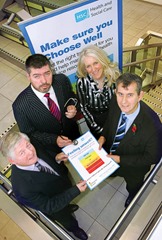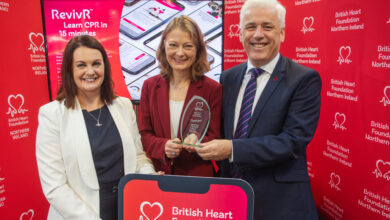Directing patients to the right services
 The NIDirect website is helping people to choose the best place to get care and treatment.
The NIDirect website is helping people to choose the best place to get care and treatment.
Members of the public are being directed to the most appropriate health and social care services through the Executive’s www.nidirect.gov.uk website.
Hospital services are regularly under pressure from patients who can receive the same – or better – treatment in other settings. The ‘choose well’ section (www.nidirect.gov.uk/choosewell) outlines six options, depending on the seriousness of the condition.
1. Self-care
The best choice to treat minor illnesses, ailments and injuries. A range of common illnesses and complaints, such as aches and pains, coughs, colds, upset stomachs and sore throats can be treated with over-the-counter medicines and rest.
2. Local pharmacy
A local pharmacist can provide confidential, expert advice and treatment for a range of common illnesses and complaints without having to wait for a GP appointment or going to an emergency department.
The pharmacist may be able to help with eye infections, stomach upsets, skin conditions, allergies, aches and pains, giving up smoking, blood pressure, diabetes monitoring and needle exchange, emergency contraception, pregnancy testing, and common children’s health problems.
Repeat prescriptions from a daytime GP surgery should be collected before the weekend or a public holiday. A GP out-of-hours service will only provide repeat prescriptions in exceptional circumstances.
3. General practitioner
GPs provide medical advice, examinations, prescriptions and ongoing care for longstanding or chronic conditions. They can also diagnose symptoms and carry out vaccinations and simple surgical procedures.
A GP out-of-hours service is available for providing urgent medical care when a surgery is closed. These operate from 6pm each weekday evening until the surgeries re-open the next morning and over 24 hours on Saturdays, Sundays and public holidays.
When a call comes in, the doctor or nurse will give advice over the telephone, decide if the person needs to be seen by a doctor or will refer them to another service if required.
4. Minor injuries unit
A minor injuries unit can treat injuries that are not critical or life-threatening such as injuries to upper and lower limbs, broken bones, sprains, bruises and wounds, bites, burns and scalds, minor head and facial injuries, and related infections.
5. Emergency department
Emergency departments provide the highest level of emergency care for patients, especially those with sudden and acute illness or severe trauma such as suspected heart attacks and strokes, serious head injuries and injuries resulting from serious accidents.
6. Call 999
A person should always call 999 if someone is seriously ill or injured and their life is at risk.
Choose well leaflets for each trust area are available online along with audio recordings and translations into Polish, Portuguese and Lithuanian. A range of videos to explain which service to use is available at www.youtube.com/hscboard
Health and social care facilities in Northern Ireland are mapped at servicefinder.hscni.net





